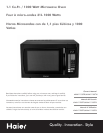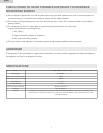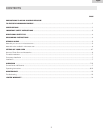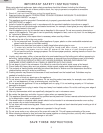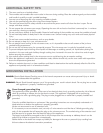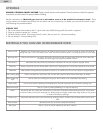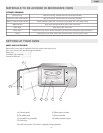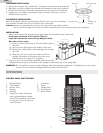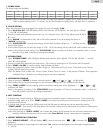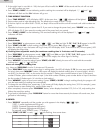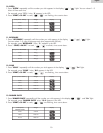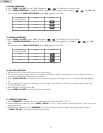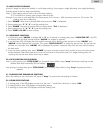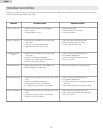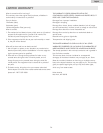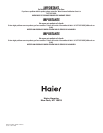
3
English
IMPORTANT SAFETY INSTRUCTIONS
When using electrical appliances, basic safety precautions should be followed, including the following:
WARNING - To reduce the risk of burns, electric shock, fire, injury to persons or exposure to excessive
microwave energy:
1.
Read all instructions before using the appliance.
2. Read and follow the specific "PRECAUTIONS TO AVOID POSSIBLE EXPOSURE TO EXCESSIVE
MICROWAVE ENERGY" on page 1.
3. This appliance must be grounded. Connected only to properly grounded outlet. See "GROUNDING
INSTRUCTIONS" on page 5.
4. Install or locate this appliance only in accordance with the provided installation instructions on page 8.
5. Some products such as whole eggs and sealed containers, for example, closed glass jars may explode and
should not be heated in this oven.
6. Use this appliance only for its intended use as described in this manual. Do not use corrosive chemicals or
vapors in this appliance. This type of oven is specifically designed to heat, cook or dry food. It is not designed
for industrial or laboratory use.
7. As with any appliance, close supervision is necessary when used by children.
8. To reduce the risk of fire in the oven cavity:
a. Do not overcook food. Carefully attend appliance if paper, plastic or other combustible materials are
placed inside the oven to facilitate cooking.
b. Remove wire twist-ties from paper or plastic bags before placing bag in oven.
c. If materials inside the oven should ignite, keep oven door closed, turn oven off, and
disconnect the power cord or shut off power at the fuse or circuit breaker panel.
d. Do not use the cavity for storage purposes. Do not leave paper products, cooking utensils or food in the
cavity when not in use.
9. Liquids, such as water, coffee, or tea are able to be overheated beyond the boiling point without appearing to
be boiling. Visible bubbling or boiling when the container is removed from the microwave oven is not always
present. THIS COULD RESULT IN VERY HOT LIQUIDS SUDDENLY BOILING OVER WHEN THE
CONTAINER IS DISTURBED OR A UTENSIL IS INSERTED INTO THE LIQUID.
10. Do not deep fry food in the microwave. It is difficult to control the fat which could cause a fire hazard.
11. Pierce foods with heavy skins such as potatoes, whole squash, apples and chestnuts before cooking.
12. The contents of feeding bottles and baby jars should be stirred or shaken and the temperature should be
checked before serving in order to avoid burns.
13. Cooking utensils may become hot because of heat transferred from the heated food. Potholders may be
needed to handle the utensil.
14. Do not cover or block any openings on the appliance.
15. Do not store or use this appliance outdoors. Do not use this product near water, for example, near a kitchen
sink, in a wet basement, or near a swimming pool, and the like.
16. Do not operate this appliance if it has a damaged cord or a plug, if it is not working properly or if it has been
damaged or dropped.
17. Do not immerse cord or plug in water. Keep cord away from heated surface. Do not let cord hang over edge of
table or counter.
18. Use only thermometers which are specifically designed for use in microwave ovens.
19. Be certain the glass tray and roller ring are in place when you operate the oven.
20. This appliance should be serviced only by qualified service personnel. Contact nearest authorized service facil-
ity for examination, repair, or adjustment.
21. Oversized foods or oversized metal utensils should not be inserted in a microwave/convection oven as they
may create a fire or risk of electrical shock.
22. Do not clean with metal scouring pads. Pieces can burn off the pad and touch electrical parts involving a risk of
electric shock.
23. Do not use paper products when appliance is operated in the grill mode.
24. Do not cover racks or any other part of the oven with metal foil. This will cause overheating of the oven.
25. When cleaning surfaces or door and oven that comes together on closing the door, use only mild, nonabrasive
soaps, or detergents applied with a sponge or soft cloth.
SAVE THESE INSTRUCTIONS



